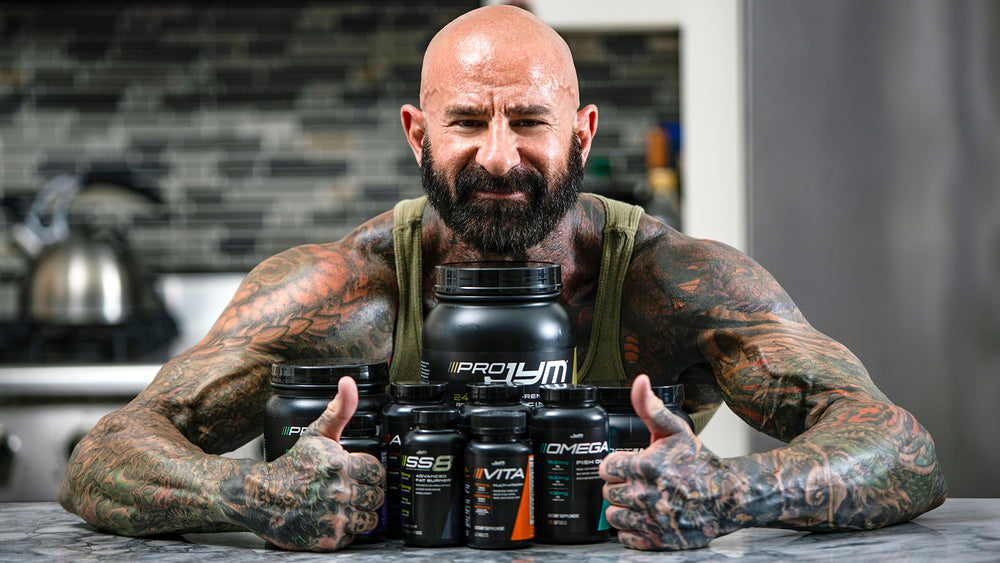The supplement half of my two-part series on the battle between published science and commonly-held myths otherwise known as "broscience"
I am dedicated to bringing you the truth on all things training, nutrition, and supplement related. I am also dedicated to giving you guys info in a way that makes reading a lot of the boring science details easier and more fun. One of the roles I find the most critical is cutting through all the BS that is out there to give you the real science-backed advice you need to get bigger, stronger, and leaner.
I always stay up to date with the latest cutting-edge science published in peer-reviewed journals and presented at scientific meetings all over the world. Many of the studies I get directly from my colleagues doing the research. Some of the studies I have conducted myself. But published science is not always the be-all and end-all of what works in the gym. It also has to hold up with real-world application in the gym. And as you will see in this two-part series, sometimes broscience actually trumps published science.
We sometimes get it wrong. In fact, I was involved in planning a study on creatine with a colleague of mine at a university on the east coast. We had to abort the study because the scientists on the IRB (internal review board) reviewing our study proposal were afraid that giving subjects creatine was too dangerous! Yes, can you believe that even in 2012, there were scientists who had no clue about creatine despite all the research showing it to be safe and effective?! This is what I am talking about when I say sometimes you should ignore the advice of these "experts" as they are not really experts on the topic they are offering advice on.
So in this article, I will be putting broscience up against published science on the topic of nutrition and supplementation to see who emerges the winner. To see how "conventional wisdom" stacks up against real science when it comes to training check out part two of this series, Real Science vs. Broscience: Training.
Is Caffeine Bad for Blood Flow?
One question I get asked a LOT is: "Why is caffeine included in pre-workout supplements that include nitric oxide (NO) boosters when caffeine is a well-known vasoconstrictor that reduces blood flow?"
Unfortunately, there is a LOT of misinformation out there. Caffeine, for some reason, has been tagged as a supplement that constricts blood vessels and reduces blood flow to muscles. However, nothing could be further from the truth.
Broscience Says
Never take caffeine with NO boosters because caffeine causes vasoconstriction and negates the benefits of the NO boosters.
Published Science Says
Caffeine is actually a proven nitric oxide (NO) booster. In fact, researchers from Hiroshima University (Japan) gave healthy young men 300 mg of caffeine and then measured blood flow to the forearm muscles. They reported in the American Journal of Cardiology that the caffeine increased the dilation of the forearm blood vessels, which increased the amount of blood flow to the muscles. This increase in blood vessel dilation was due to a greater production in NO.
Winner: Published Science
Do this: Tell the bros they have no clue when it comes to caffeine. With all the benefits that caffeine has to offer you in the gym—such as increased muscle strength, better pain tolerance, greater muscle endurance, AND an NO-boost—you'd be foolish not to take 200-400 mg of caffeine 1 hour before every workout. Of course, the exception to this is when you train at night. In those instances, I recommend using Post JYM as a caffeine-free alternative to a caffeinated pre-workout like Pre JYM.
And remember the best way to get caffeine before workouts is NOT from coffee. Coffee contains other natural chemicals from the coffee bean that may interfere with caffeine's benefits. Plus, the majority of research showing caffeine's performance-enhancing benefits were done with the supplemental form of caffeine, typically caffeine anhydrous. That’s why I use that form of caffeine in Pre JYM.
References
Supporting Research
Echeverri, D., et al. Caffeine's vascular mechanisms of action. International Journal of Vascular Medicine, 2010.
Umemura, T., et al. Effects of acute administration of caffeine on vascular function. Am J Cardiol. 2006 Dec 1;98(11):1538-41.
Is Creatine Dangerous?
Despite being one of the most studied supplements available, creatine still has its doubters.
Broscience Says
Since it was first released in the early 90's, creatine was a very popular supplement with bodybuilders. Strength gains came quickly and it wasn't unheard of to gain a solid ten pounds in a just a few weeks. Smart bodybuilders immediately gravitated toward this very effective supplement, making it one of the most popular in the history of supplements.
Published Science Says
For the first decade that creatine was on the market scientists were hesitant to agree that it worked to boost athletic performance and muscle growth. In fact, many claimed that it could cause dehydration, muscle cramps, and even increase the risk of muscle injuries.
Back when I was a doctoral student and a research/teaching assistant at the University of Connecticut, the undergrads would often ask me when I was lecturing on sports nutrition, whether or not creatine worked. My answer was always yes. And every time I gave that answer and one of the professors in the department heard me they would respond with, "Jim, we can't say that creatine works. There is not yet enough data to support its effectiveness."
My argument was that yes, while in the mid 90's there weren't yet the hundreds of studies confirming creatine's effectiveness, but hundreds of people I knew and trained with were all gaining a good 10 pounds of muscle and at least 10-20% more strength from supplementing with creatine. Those who were using it in the gym back then knew that there was no debating the fact that creatine worked and it worked well.
Fast forward almost 20 years and a few hundred studies on the effectiveness and safety of creatine and scientists (the smart ones anyway) agree that not only is creatine very effective but also very safe and it does not cause dehydration, muscle cramps or muscle injuries. Research has also shown that creatine leads to long-term increases in muscle growth and strength through a number of different mechanisms. Of course, as I mentioned above, some very misinformed doctors and scientists still to this day think it's dangerous. In fact, many athletes have informed me that their doctors have mistakenly warned them to stop taking creatine due to the "dangers" involved.
Winner: A Draw
...With the edge going to Broscience for knowing the truth on creatine first. Sometimes the gym is the best laboratory.
Do this: If a doctor or other health care professional tells you to stop taking creatine because it is dangerous, tell them to do some current research. Depending on the form you use, take about 1-5 grams of creatine with your pre and post-workout shake. On rest days, take one dose of creatine with your first meal of the day. Although many forms of creatine do not require a loading phase, creatine monohydrate does require a loading phase—if you want results in a hurry. To do this take 5 grams of creatine monohydrate four to five times per day with meals, with two of those doses on workout days being pre and post-workout. Follow this loading phase for 5-7 days. This is one of the reasons I prefer the hydrochloride version of creatine (creatine HCl), however, as the loading phase is unnecessary, just one of the many benefits of creatine HCl vs monohydrate.
References
Supporting Research
Kraemer, W. J., and J. S. Volek. Creatine supplementation: Its role in human performance. Clin. Sports Med. 18:651– 666, 1999.
Kelly, V. G., and D. G. Jenkins. Effect of oral creatine supplementation on near-maximal strength and repeated sets of high-intensity bench press exercise. J. Strength Condit. Res. 12:109 – 115, 1998.
Becque, M.D., et al. Effects of oral creatine supplementation on muscular strength and body composition. Med. Sci. Sports Exerc. 32:654–658. 2000.
Rawson, E. S. and Volek, J. S. Effects of creatine supplementation and resistance training on muscle strength and weightlifting performance. J Strength Cond Res. 17(4):822-31, 2003.
Vandenberghe, K., et al. Long-term creatine intake is beneficial to muscle performance during resistance training. J. Appl. Physiol. 83:2055–2063, 1997.
Burke, D.G., et al. The effect of whey protein supplementation with and without creatine monohydrate combined with resistance training on lean tissue mass and muscle strength. Int. J. Sport Nutr. Exerc. Metab. 11:349–364. 2001.
Dangott, B., et al. Dietary creatine monohydrate supplementation increases satellite cell mitotic activity during compensatory hypertrophy. Int. J. Sports Med. 21:13–16. 2000.
Hespel, P., et al. Oral creatine supplementation facilitates the rehabilitation of disuse atrophy and alters the expression of muscle myogenic factors in humans. J. Physiol. 536:625–633, 2001.
Olsen, S., et al. Creatine supplementation augments the increase in satellite cell and myonuclei number in human skeletal muscle induced by strength training. J Physiol. 573(Pt 2):525-34, 2006.
Volek, J. S., et al. Performance and muscle fiber adaptations to creatine supplementation and heavy resistance training. Med. Sci. Sports Exerc. 312:1147– 1156, 1999.
Cancela, P., et al. Creatine supplementation does not affect clinical health markers in football players. Br J Sports Med. 42(9):731-5, 2008.
Greenwood, M., et al. Cramping and Injury Incidence in Collegiate Football Players Are Reduced by Creatine Supplementation. J Athl Train. 38(3):216-219, 2003.
Greenwood, M., et al. Creatine supplementation patterns and perceived effects in select division I collegiate athletes. Clin. J. Sports Med. 10:191–194, 2000.
Greenwood, M., et al. Creatine supplementation during college football training does not increase the incidence of cramping or injury. Mol Cell Biochem. 244(1-2):83-8, 2003
Kreider, R. B., et al. Long-term creatine supplementation does not significantly affect clinical markers of health in athletes. Mol Cell Biochem. 244(1-2):95-104, 2003.
Terjung, R. L., et al. The American College of Sports Medicine Roundtable on the physiological and health effects of oral creatine supplementation. Med. Sci. Sports Exerc. 32(3): 706 –717, 2000.
Cribb, P. J. and Hayes, A. Effects of supplement timing and resistance exercise on skeletal muscle hypertrophy. Med Sci Sports Exerc. 38(11):1918-25, 2006.



